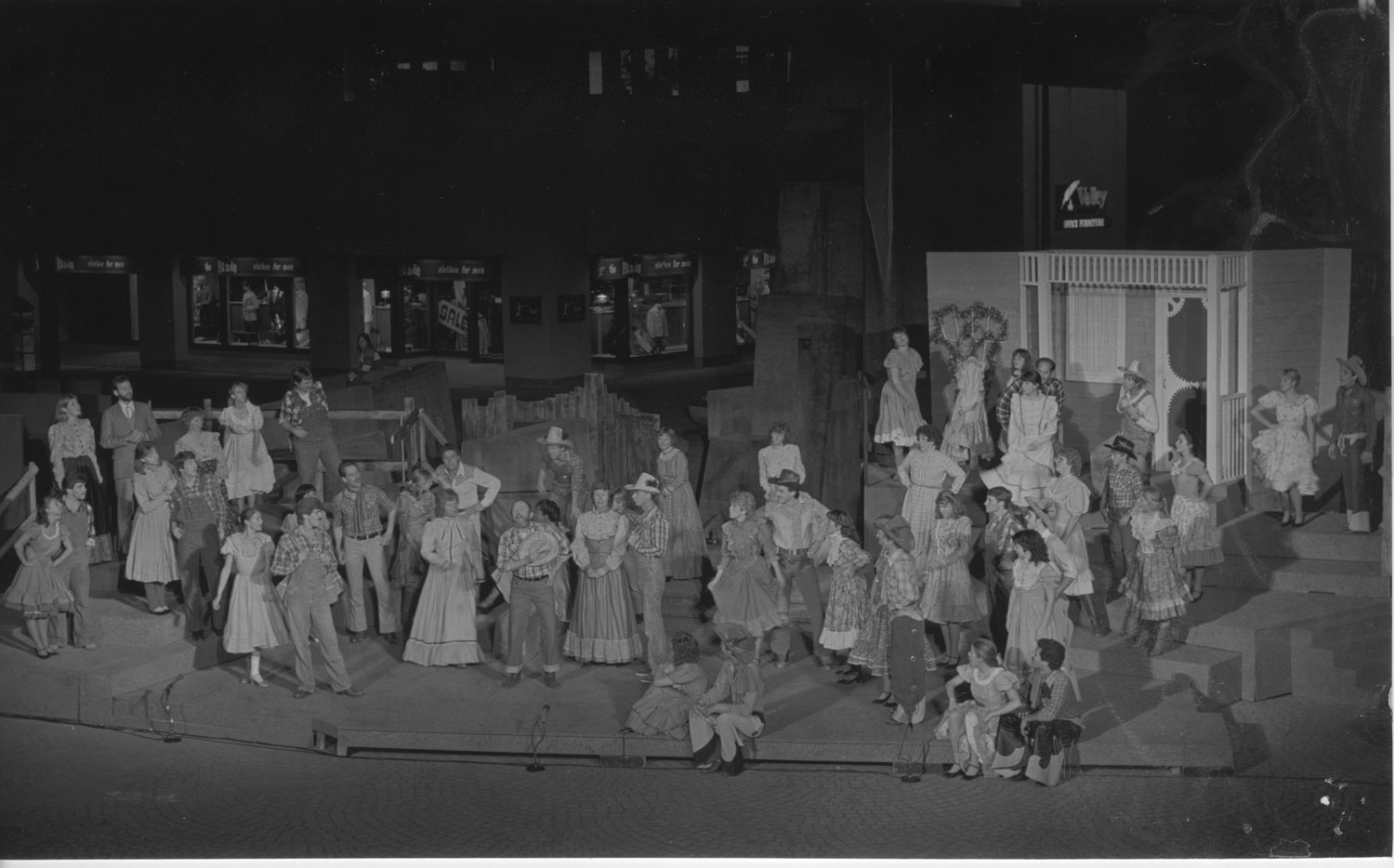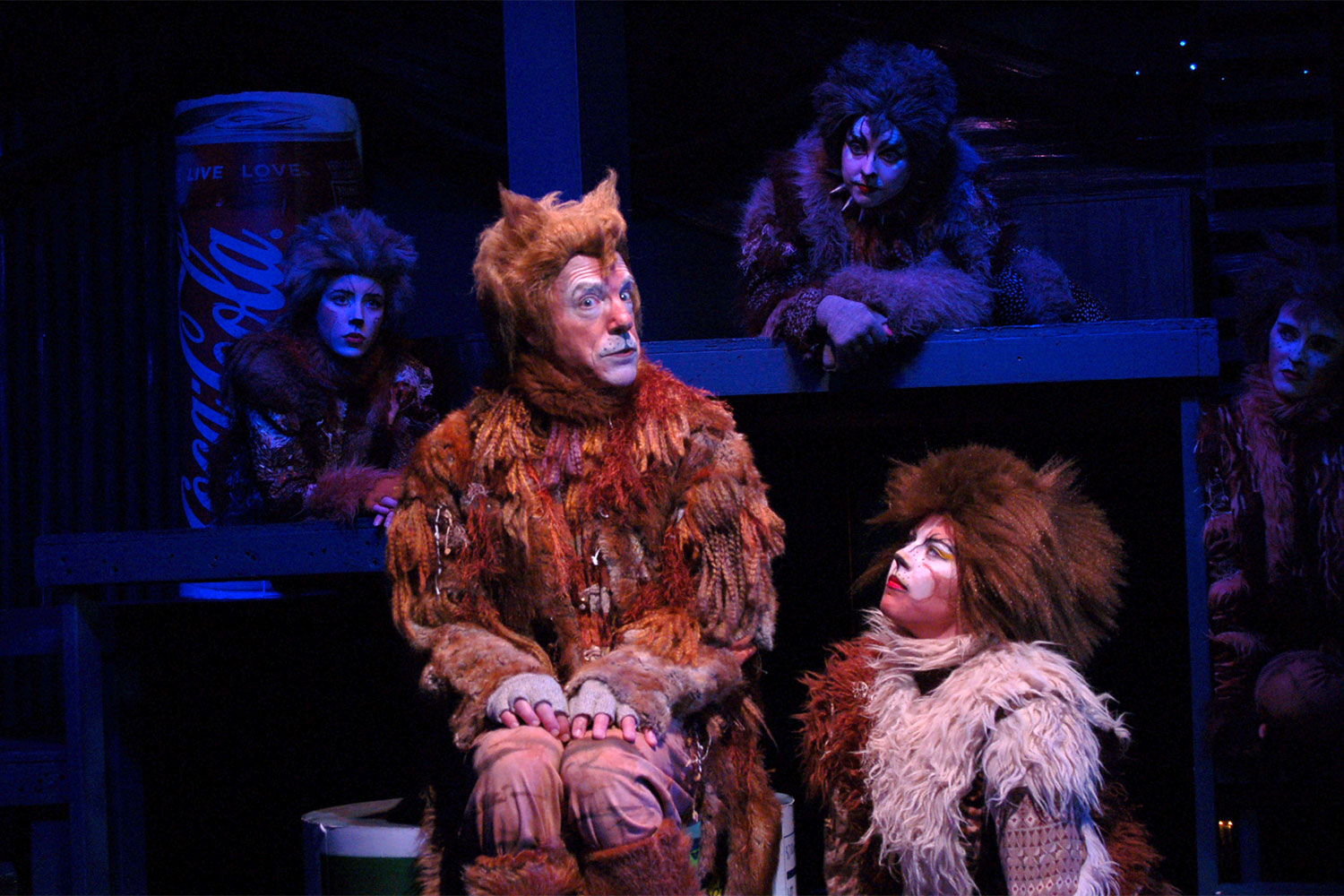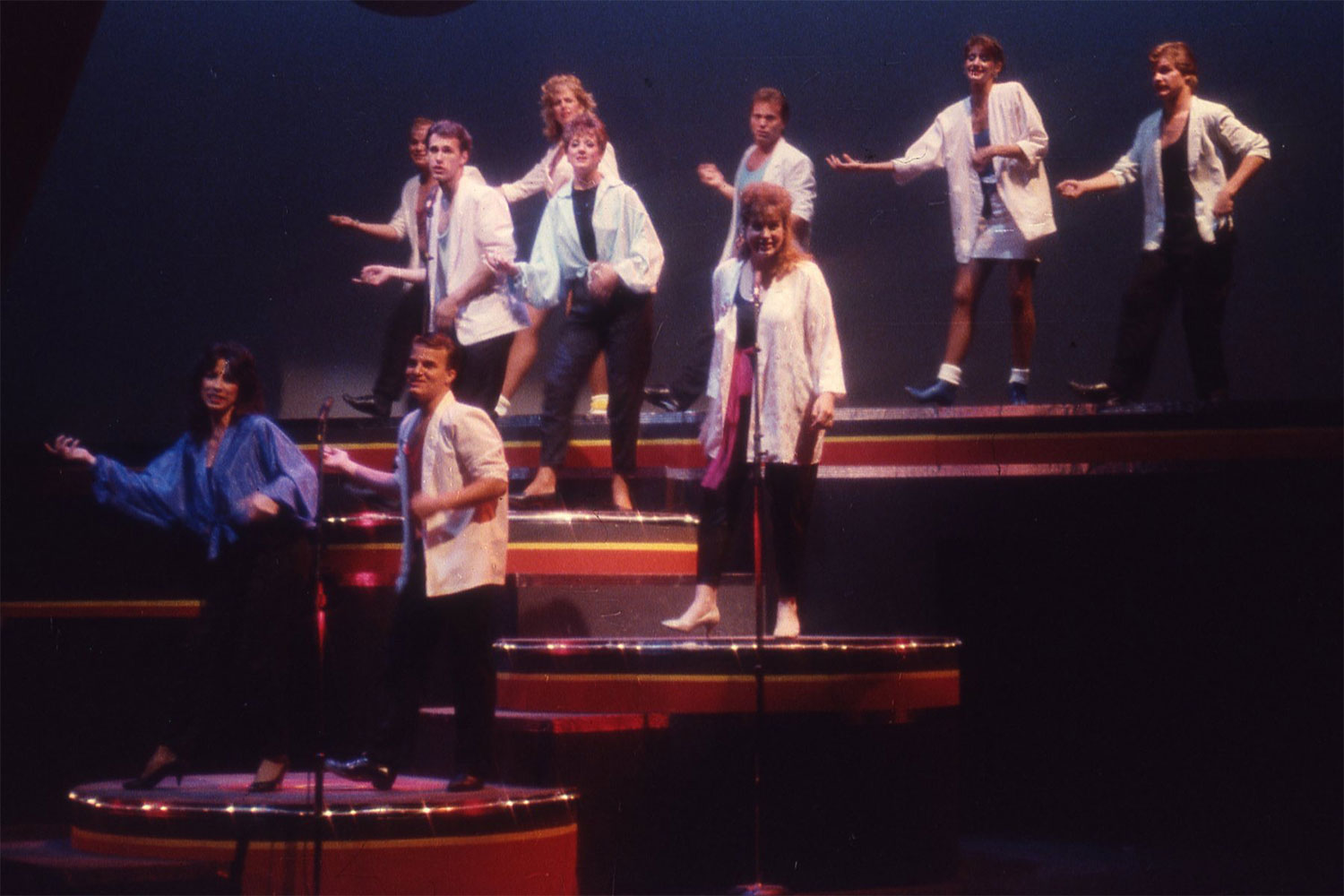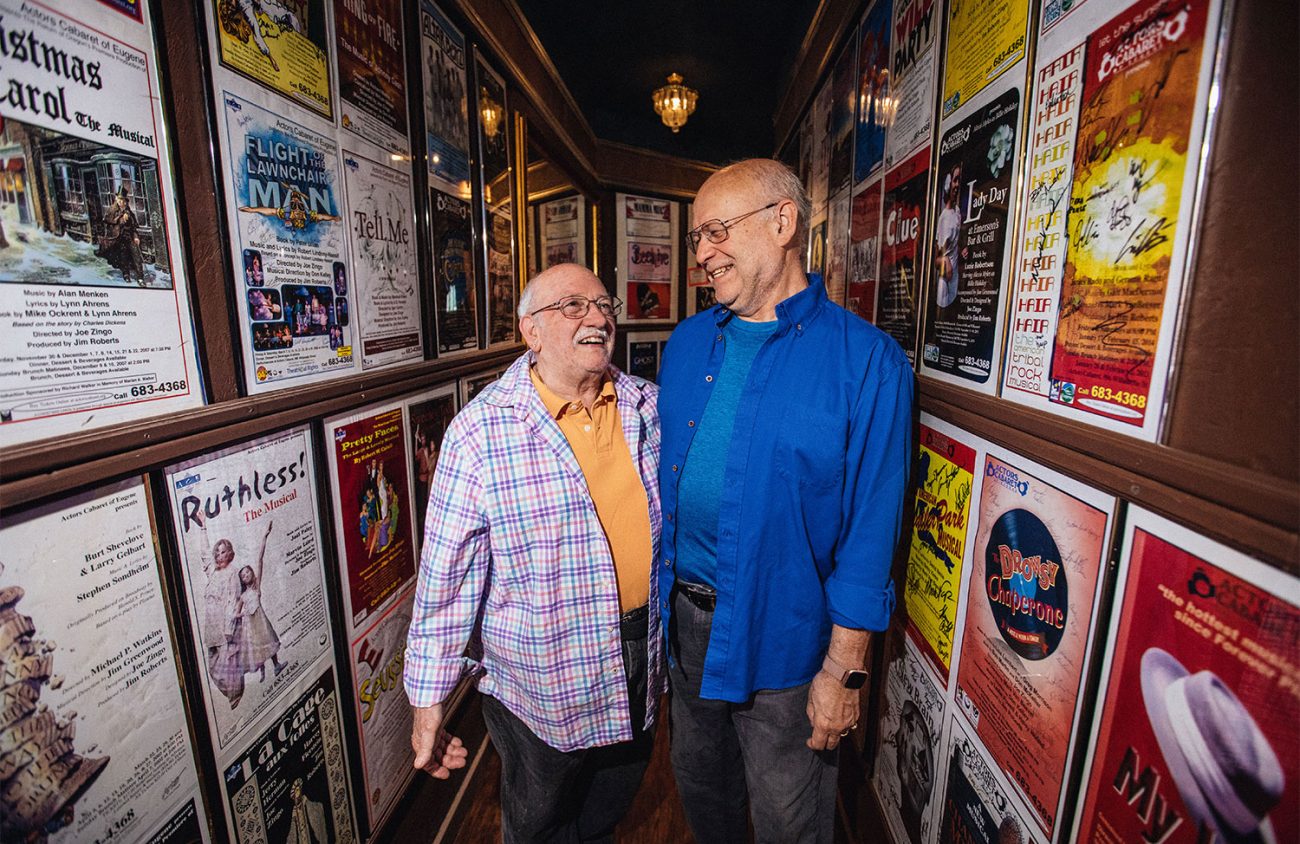How does a 50-year-long fairytale romance in theater begin?
It begins, once upon a time, during a low-budget production of Fiddler on the Roof, of course. In 1969, with local legend Ed Ragozzino directing the show, Jim Roberts and Joe Zingo — future founders of Actors Cabaret of Eugene — fatefully locked eyes from across the stage during a spirited run-through of “If I Were a Rich Man.”
Or at least that’s how I picture it. The simpler truth is that Zingo was a lead dancer, Roberts was in the pit with his violin, and the two just happened to connect over their love of theater.
“We met through doing different shows together, and then we just decided we wanted to start our own company,” Roberts says. Their encounter kicked off an inspiring and enduring decades-long rapport with the Eugene arts community and with each other.
In celebration of ACE’s 40th anniversary serving Eugene’s creative culture, let’s take a peek at the Technicolor dreamcoat that is their story.
Zingo, Connecticut-born, relocated to the University of Oregon as a grad student in the arts and special education. He would eventually go on to fulfill both his creative and administrative sides through teaching at South Eugene High School at a time when the school’s theater program was at the top of its game. Now 75 and perhaps a little stouter than in his chorus-line days, Zingo wears a warm grin underneath a white beard and a brightly colored scarf.
Roberts is Oregon-grown by his own definition. A student of both business and music, he, too, attended the UO as well as Lane Community College. Roberts also maintained a career with the railroad for more than 20 years, all while working alongside Zingo and a handful of other local theater buffs back in the ’70s. At 69, he is the taller of the two, equal in warmth and probably someone’s favorite uncle.
Enlarge

Photo Courtesy Actor’s Cabaret
From those old days to the present day mom-and-pop dinner theater that is ACE, Roberts and Zingo have made it their life’s mission to create and cultivate the magic of theater for the masses — and I do mean masses. The list of ACE alums who have gone on to careers in the arts is expansive.
Likewise, ACE has been one of only two community theater companies — the other is Very Little Theatre, even older — to survive here for decades, packing in show after show with dedicated patrons.
If you’ve ever been to a musical at ACE, then you’ve probably run into to Roberts, quietly smiling from behind wire-rimmed glasses, instructing the usher where to seat you or stoically standing guard from the control booth above the back-row seats.
The more-spirited Zingo made your lasagna, a deeply coveted family recipe, but only after, say, he finished repurposing a leather jacket for a steam-punk Rocky Horror Picture Show.
“Jim is the grounding energy and Joe is the frenetic, exciting energy,” notes longtime friend and ACE veteran Ashley Apelzin.
I can picture the Facebook quiz now: Are you a Joe, or a Jim? If you prefer to stay out of the limelight, but your affable laugh reminds everyone that you still know how to have a good time, then you’re probably a Jim. If you have the gift of gab and glitz, then you’re definitely a Joe.
Like a jollier and less critical version of Statler and Waldorf, the old guys from The Muppet Show who sit in the balcony above the stage, Roberts and Zingo are free-flowing fixtures within the downtown walls they have called home since opening their doors in 1985.
Before then, the two men ran productions out of Sheldon High School as well as on the pedestrian mall that once occupied Broadway and Willamette Street. Roberts remembers refashioning the old fountain into a stage and dragging in bleachers for the three shows they had in rotation.
One afternoon, the two went out for lunch down the street to what used to be Seymour’s Café.
“We looked at each other and said, ‘This would be a wonderful dinner theater if it’s ever available,’” Zingo recalls.
It would be another decade before they would turn it into the half-cabaret, half-dinner-theater cauldron of costumes it is today.
Quaint and cozy, the atmosphere is not unlike your favorite dive bar. The karaoke is better, but you can almost still see the cigarette smoke in the spotlights, long before any Addams Family children performed on the stage.
The stage itself is hardly a place for an elaborate musical production, and yet I’ve seen them turn it into the (pre-fire) Notre Dame Cathedral. It’s a bit reminiscent of a Manhattan studio apartment, more suitable for a modest pantry, but somehow there are five college co-eds sharing four walls and a bathroom in pitch-perfect harmony.
The homey feeling of ACE is emphasized by its history of heartfelt productions. Zingo and Roberts can take the most superficial, artificial, over-the-top musical and bring forth the true essence of the characters. No one wants to see a bad rendition of Cats. The original is painful enough, but ACE has found a way to reinvent the wheel by tapping into our common humanity over Italian food and custom drinks.
“And the food better be damn good,” Zingo adds.
But why on Earth would anyone want to own a theater company? It’s expensive, the hours are endless, the pay is crap — it’s an all-encompassing endeavor.
In fact, one could say operating a community theater takes a certain kind of…
“Idiot,” Zingo finishes for me.
Enlarge

Photo Courtesy Actor’s Cabaret
I wouldn’t exactly put it that way, though maybe there is a level of crazy involved. The main ingredient, however, seems to be passion.
At one point, Roberts and Zingo were running a whopping 22 shows a year out of both the main stage and a smaller theater in the back of ACE. That small room has now become a dressing room and catchall for the ghosts of musicals past.
ACE has recently peeled back to a modest six shows a year, but with no less fervor than the days of orthodox plays in back and show tunes in the front.
Roberts and Zingo have workshopped Broadway and off-Broadway productions, hosted a bevy of world premieres and reinvented all your favorite classics, such as the Wizard of Oz and something called The Vampire Lesbians of Sodom.
Older and a little wearier these days, Roberts and Zingo still live for the theater — and, more specifically, theater people.
Over the years the pair have inspired countless people to pursue their dreams and to trust themselves. They have opened the door to people who normally wouldn’t find themselves on a stage. They have nurtured and refined talented artists who have gone on to work on Broadway, own their own theaters, work in television or music. Roberts and Zingo list off names of ACE alumni like proud parents in a game of verbal Ping-Pong.
Jason Bortz, an artist out of California and a former theater student of Zingo’s at South Eugene, recalls the level of excellence Joe demanded from his students.
“He lit a fire in me to be creative,” Bortz says, “and to emulate that sort of drive to do the absolute best that I could do,” particularly during a time of high school hardship.
Bortz also mentions something about Zingo getting into into bodybuilding at one point, but we’ll just leave that bit of information amongst the colorful patches.
After high school, Bortz went on to perform at ACE. From there he continued his education in the arts, ran a theater company and, today, he continues his work as an actor, a screenwriter, a teacher and a coach.
Tracy Bonham, the Grammy-nominated alt-rock singer of “Mother Mother” and heroine of all my mini-skirt angst, credits Roberts and Zingo for cultivating the confidence she needed to finally open up to her own truth. Now, aside from touring and raising a child, Bonham says she is working on (or at least trying to find the time for) a “folk opera” as well as the development of an artistic curriculum for New York City youths that is inspired by many of the philosophies Roberts and Zingo instilled in her.
“It’s all the things I love about the stage,” Bonham says. “The feel of the floor, the sense of community, the Saturday rehearsals, this bubble that they [Roberts and Zingo] created…”
Enlarge

Photo Courtesy Actor’s Cabaret
Zingo teaches more than just theater.
“Joe taught me how to drive,” Apelzin tells me casually over coffee. “He showed me hand-over-hand turning, easy on the brakes…”
Oh, to be a fly in that car.
The 28-year–old actress, singer and now director was barely 10 at her first audition during a time when ACE had a prolific kids program. “All day long I would hang out at the theater,” Apelzin reminisces. “They were my family.”
She spent some time at The American Musical and Dramatic Academy pursuing an education in the arts before inevitably returning to Eugene and ultimately her on and off stage family.
Anthony Krall — Apelzin’s roommate in college and perhaps ACE’s most talked-about talent — is said to be the successor of both Roberts and Zingo.
“It’s been an intensive leaning process of how everything comes together that snowballed into ‘We want you to do this when we decide to step back,’” Krall says.
Which time, for Zingo, is “when I die.”
Krall admittedly has a long way to go, but Roberts and Zingo seem confident in the young actor and director’s ability to continue their vision. This says a lot for two people who have dedicated their entire lives to nurturing a family theater.
Through the years, ACE has been a community favorite. It’s not necessarily the best of the best — the sound system has been repeatedly rebuked over the years, and its daring initiative hasn’t always paid off — but ACE has made a lot of lemonade out of lemons.
The theater is run by a small staff of dedicated volunteers who do it all — as in, your wait staff are also the performers. And yet, the experience is one that touches the better parts of the soul. Sometimes it’s sweet, vibrant and unexpected, and sometimes it’s sour, making you cringe just a little. But it’s still the same old lemonade — homemade and refreshing, by turns tart and sugary.
On the off chance that Roberts and Zingo are not busy at the theater, you can find them in their Santorini-inspired backyard, with Zingo tending to the microclimate of palm trees and orange lilies, and Roberts presumably on the phone with a rental house out of New York.
The two hope to travel more in the future, they say — perhaps a bucket-list cruise to Alaska.
This brings up a vision.
Jim and Joe are on that cruise, and neither of them can quite figure out how to take it easy, and so they hold auditions up on the shuffleboard deck for Anything Goes, and Roberts recruits a symphony orchestra while Zingo stitches a splash of sequins to the blue and white sailor uniforms.
After the final bows, Roberts and Zingo graciously shake hands with the line of exuberant spectators, sighing as the last of them make their way out of the ocean-bound theater — a brief reprieve, until tomorrow night.
And perhaps a moment passes between the two: It’s been a good cruise, it’s been a good run — it’s been a good life.
